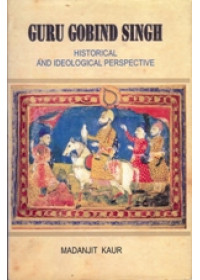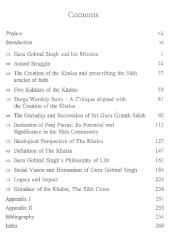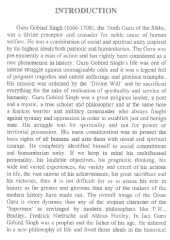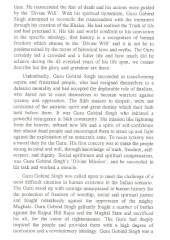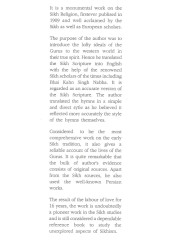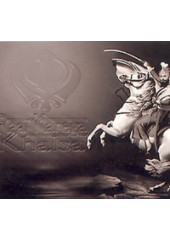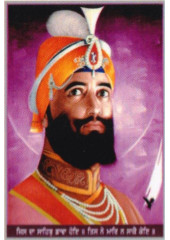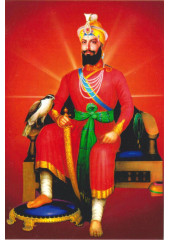Monday to Saturday - 10:00 Am to 9 PM
Now Enjoy Bulk Discounts on Books as Mentioned Below
These Discounts are in addition to the Discounts on Individual Books (Visible as Bulk Discount for Books in Cart)
Extra 10% Off If Books Purchased Exceeds Rs 3000 or 75 USD or 60 GBP or 60 Euro or 100 AUD or 100 CAD
Extra 15% Off If Books Purchased Exceeds Rs 6000 or 150 USD or 120 GBP or 120 Euro or 200 AUD or 200 CAD
Extra 20% Off If Books Purchased Exceeds Rs 15000 or 225 USD or 180 GBP or 180 Euro or 300 AUD or 300 CAD
Extra 25% Off If Books Purchased Exceeds Rs 30000 or 300 USD or 240 GBP or 240 Euro or 400 AUD or 400 CAD
Preface Of The Book 'Guru Gobind Singh - Historical and Ideological Perspective' By Madanjit Kaur
This book is not only an abstract of the history and thought of Sri Guru Gobind Singh Ji, in itself as a pure academic exercise. It also aims to understand and bring into focus the empirical and applied aspects of the great Guru's teachings in the development of Sikhism and growth of new traits in the process of socio-cultural revival and rise of freedom consciousness in the political history of India.
This volume does not claim any mastery on the subject under study. It simply attempts to exemplify only those aspects of the life, thought and legacy of Sri Guru Gobind Singh Ji, which have not been studied thoroughly by the researchers. The thrust of this book is to grasp the dynamic vision of the Tenth Master on the destiny of the Indian Nation in context to contemporary socio-political milieu and to bring forth to the attention of the multi-cultural Indian communities, the pragmatic significance of Guru Gobind Singh's teachings in the present context.
Sri Guru Gobind Singh's life is a telling reaffirmation of his divine mission and universal and humanitarian Sikh cultural heritage. Because of the wide range of his dynamic vision and philosophy of life, the Guru became an uncompromising advocate of humanitarian principles by proclaiming manas ki jat sabhe eko pahchanboo (all mankind are one). He was the progenitor of the democratic revolution in India. The life and teachings of Guru Gobind Singh are a matter of international significance. The teachings of the Guru in the realm of intellectual and moral approach to the problem of human existence may be considered as the most significant contribution of his times. Guru Gobind Singh had not projected the glorious cultural heritage of our multicultural country but had also introduced new innovations pertaining to social transformation and universal value pattern for the protection of human freedom and democratic rights and welfare of the global society.
The lesson this academic exercise emphasizes stress on is on the sound moral reorientation of the Indian Society for survival and future prospects of the multi-cultural Indian Nation in view of current cultural crisis created by erosion of ethical values; indifference to human sufferings, communal politics, tension, suspicion and distrust between majotity and minority communities. The challenge of international terrorism; open war hysteria between big powers of the West and ethinic communities of the East caused by clash of market interests and rise of fundamentalism reminds us the dire need of international understanding and unity of mankind as preached by Guru Gobind Singh.
The publication of the book Guru Gobind Singh: Historical and Ideological Perspective marks our tribute to the great Guru on the forthcoming occasion of the celebration of the 300th Jyoti Jot Samavana divas (departure from the moral world) of Guru Gobind Singh (October 30, 1708 A.D.) and the 300th Guru Gurta Gaddi Shatabdi Samaroh (300th anniversary of the succession of Sri Guru Granth Sahib as the 'Guru' of the Sikhs proclaimed by Guru Gobind Singh before his demise at Nanded on October 27, 1708 A.D.)
I would like to express my gratitude to Dr. D. P. Singh of Nangal for reading the manuscript of this book.
I acknowledge with deep gratitude the support of my family members who have undertaken the tedious job of looking after my ailing health during the last four years to enable me to complete this task.
I am highly indebted to all those scholars whose works I have consulted in preparing this monograph. My thanks are due to Dr. Harpal Singh for extending his full support in collecting information and research material from Himachal Pradesh for this volume. I am grateful to S. Satpal Danish (Danish Studio, Amritsar), Late S. Amolak Singh Artist (Honorary Curator, Central Sikh Museum Golden Temple, Amritsar) and S. Kulwant Singh Chaudhari, Manager, Gurudwara Sri Harimandir Sahib, Paonta Sahib, H.P. for providing me valuable illustrations to make this work more interesting and significant.
I express my deep gratitude to Mr. Harish Jain of Unistar Books Pvt. Ltd., Chandigarh, for tracing me after my retirement from Guru Nanak Dev University, Amritsar to get hold of my unpublished works, otherwise, this book would not have come out in print.
Finally, I apologise to the readers that on account of my serious illness, I could not prepare the manuscript of this book upto the mark. I still hope this book would be welcomed by the readers not only as token of our homage and gratitude to Guru Gobind Singh, but a reminiscence of the significant historical and moral lessons it imbibes. I have not no doubt that readers, researchers, students, devotees and serious scholars of Sikhism, comparative theology, Philosophy and History will also find this work useful and commendable.
In the end, I must add, that for all the drawbacks and opinions expressed in this book, I alone am to be held responsible.
| Date: August 8, 2007 | Madan Jit Kaur |
| Retd. Prof. and Chairperson, | |
| Place: Chandigarh | Guru Gobind Singh Chair, |
| Deptt. of Guru Nanak Studies, | |
| Guru Nanak Dev University, | |
| Amritsar. |
Introduction to the Book 'Guru Gobind Singh - Historical and Ideological Perspective' By Madanjit Kaur
Guru Gobind Singh (1666-1708), the Tenth Guru of the Sikhs, was a divine preceptor and crusader for noble cause of human welfare. He was a combination of social and spiritual unity inspired by the highest ideals both patriotic and humanitarian. The Guru was pre-eminently a man of action and has rightly been considered as a rare phenomenon in history. Guru Gobind Singh's life was one of intense struggle against unimaginable odds and it was a legend full of poignant tragedies and untold sufferings and glorious triumphs. His mission was ordained by the 'Divine Will' and he sacrificed everything for the sake of realisation of spirituality and service of humanity. Guru Gobind Singh was a great religious leader, a poet and a mystic, a true scholar and philosopher and at the same time a fearless warrior and military commander who always fought against tyranny and oppression in order to establish just and benign state. His struggle was for spirituality and not for power or territorial possession. His main consideration was to protect the basic rights of all humans and arm them with moral and spiritual courage. He completely identified himself to social commitment and humanitarian unity. If we keep in mind his multifaceted personality, his laudable objectives, his pragmatic thinking, his wide and varied experiences, the variety and extent of his actions in life, the vast canvas of his achievements, his great sacrifices and his victories, then it is not difficult for us to assess his role in history as far greater and glorious than any of the makers of the modern history have made out. The overall image of the Great Guru is more dynamic than any of the utopian character of the 'Superman' as envisaged by modern philosophers like F. H., Bradley, Fredrick Nietzsche and Aldous Huxley. In fact Guru Gobind Singh was a prophet and the father of his age. He ushered in a new philosophy of life and lived those ideals in the historical time. He transcended the fear of death and his actions were guided by the 'Divine Will'. With his spiritual dynamism, Guru Gobind Singh attempted to reconcile the transcendent with the immanent through his creation of the Khalsa. He had realised the Truth of life and had practised it. His life and works conform to his conviction in the specific ideology, that history is a recognition of human freedom which attunes to the 'Divine Will' and it is not be to predetermined by the nexus of historical laws and myths. The Guru certainly led a crowded and a fuller life and how much did he achieve during the 42 eventual years of his life span, we cannot describe but the glory and grandeur are there.
Undoubtedly, Guru Gobind Singh succeeded in transforming supine and frustrated people, who had resigned themselves to a defeatist mentality and had accepted the deplorable role of fatalists, who dared not to exert themselves to become warriors against tyranny and oppression. The Sikhs masses in despair, were not conscious of the patriotic spirit and great destiny which their faith held before them. It was Guru Gobind Singh who initiated a powerful resurgence in Sikh community. His mission like lightning from the heaven, infused new life and a spirit of self-confidence into almost dead people and encouraged them to stand up and fight against the exploitation of an autocratic state. To resist tyranny was a moral duty for the Guru. His first concern was to make the people strong in mind and will, through knowledge of truth, freedom, self-respect, and dignity. Social upliftment and spiritual compensation, was Guru Gobind Singh's 'Divine Mission', and he succeeded in his task and worked a miracle.
Guru Gobind Singh was called upon to meet the challenge of a most difficult situation in human existence in the Indian scenario. The Guru stood up with courage unsurpassed in human history for the protection of freedom of worship, social and spiritual justice and fought relentlessly against the oppression of the mighty Mughals. Guru Gobind Singh gallantly fought a number of battles against the Rajput Hill Rajas and the Mughal State and sacrificed his all, for the cause of righteousness. The Guru had deeply inspired the people and provided them with a high degree of motivation and a revolutionary ideology. Guru Gobind Singh was a man of moral ideals and was equally fearless in defending them. His personal example inspired many of his devotees to consider death for a worthy cause as the noblest goal of their life. The Guru did not aspire to personal power or glory, but instead strived for a just society, human dignity and humanitarian unity, the Guru had no territorial ambitions. His aim was for the social and moral uplift of all and to free the country from the oppressive rule. His stand was based on moral ethics and open challenge. He was the pioneer Indian leader to introduce republican set up and democratic institutions. His creation of the Khalsa was an act of great daring foresight to carry a never ending war against evil. He called his mission as Dharam Yudh - fight for victory of morality and Truth over evil and injustice. Its objective was to protect the righteous, oppressed and downtrodden people; and to destroy the evil-doers. The Guru considered Dharam Yudh his moral duty both as a 'Divine Call' and a 'Divine Compensation'.
Guru Gobind Singh can indeed be looked upon as a special messenger of God on this earth for the dispensation of Divine Justice through his revolutionary mission which was enshrined in the Divine Will. It was in the pursuance of this 'Divine Mission' that God sent Guru Gobind Singh to this world. In the Guru's own words: "You are my chosen and cherished son, whom I have installed for strengthening faith and religion. Go down to earth and propagate righteousness, And refrain the World from senseless acts." His message was not only his own people but for the whole mankind. His commandment hails his vision of the cosmic man: Recognise all Humanity as one in spirit. The universal message of the Guru has great potentiality for the futuristic concerns of Sikhism. With meagre resources at his disposal and at a very young age, Guru Gobind Singh created history with record of sufferings for faith and freedom. The martyrdom of his father, mother, four sons and hundreds of his followers for lofty ideals of freedom and justice is an unparallel example of scrifice in the history of mankind. 'Guru Gobind Singh's personality is a wonderfully harmonious combination of so many good and manly qualities, as have seldom been found blended together in one person'. A charismatic leader with a fascinating personality and magnetic fortitude,Guru Gobind Singh rallied around him thousands of followers totally dedicated to him and ready to sacrifice their lives in espousing the cause of Truth and Justice. He created a unique institution to bring spiritual awakening, social reforms, equality and political freedom. Guru Gobind Singh's greatest achievement is the Creation of the Khalsa by the famous baptismal ceremony on the Baisakhi Day of 1699 by which the Guru raised the Khalsa and bestowed on them his blessings, gift of valour and a distinct identity. The Khalsa was bound to a strict code of conduct (Rehat Maryada). It was made clear to the Khalsa that the affinity between the Khalsa and the Guru shall remain conditioned to the adherence of the Khalsa to the code of conduct prescribed by the Guru. Guru Gobind Singh also ordained the Khalsa to uphold right in every place and destroy evil in every form; should not submit to oppression and tyranny and fight for the cause of righteousness and the welfare of humanity. Since the Khalsa upheld the social values, it constituted a revolutionary force. The Khalsa was obliged to sacrifice its all at the call of the Dharma (righteousness). The service of humanity was its religion. In fact, Khalsa was meant to be an instrument of God for the fulfillment of humanity. The establishment of the Khalsa was the realisation of Guru Gobind Singh's divinely inspired vision and altruistic attitude for the upliftment of the sufferings humanity. It was a grand creative deed of history which brought a revolutionary change in the minds of the people and aroused their dormant energies to positive purposes. By the activities of the Khalsa, people were made conscious of their servitude and taught to stand up on their feet courageously to redeem their predicament. The Khalsa build up strong ethos of chivalry and gallantry having left permanent imprints on the psyche of the people of the Punjab and the history of India. Guru Gobind Singh's life unfolds like a grim and terrible romance of an incessant fight against heavy odds. But this romance is enriched by the serene and sublime impact of his personality, aura of his saintliness, and the glory of his faith in God and his solicitude for the downtrodden, as well as by the devotion of his family and the loyalty of his dedicated followers. The significance of the contributions of Guru Gobind Singh and the role he played in the history of India and world civilisation can not be overlooked and are highest grading. His contributions are enormous. He had not only introduced social transformation in India but also gave a new set of universal values and a pragmatic humanitarian vision for the formation of a global society. The debt India owes to the Great Guru is hard to be estimated.
About the Author 'Dr. Madanjit Kaur' of the Book 'Guru Gobind Singh - Historical and Ideological Perspective'
Dr. Madanjit Kaur born on 10th November 1939 in Amritsar did her M.A. and Ph.D. in History from University of Allahbad. She served in the University of Allahbad, University of Gorakhpur and Guru Nanak Dev University, Amritsar. Her thirty five years' research experience is dedicated to Sikh History. She participated in International Conferences on Sikh History and South East Asian Studies in U.S.A., U.K., Canada, Singapore and Malaysia and presented papers on Sikh History and Punjab Heritage. She had been Dean, Faculty of Humanities and Religious Studies, GNDU; Chairperson, Press and Publication, GNDU; Editor, Journal of Sikh Studies, GNDU; Member Senate and Syndicate, GNDU and member Executive Council, Bhai Veer Singh Sahiyta Sadan, New Delhi. She retired as Professor, Deptt. of Guru Nanak Studies, GNDU and served as Professor and Chairperson, Guru Gobind Singh Chair till 2001.
Her research work is acknowledged in India and abroad. S.G..P.C. has honoured her twice, in 1999 and 2004. All India Sikh Educational Conference has also honoured her twice. She was honoured by: Punjab Modern Academy of Fine Arts and Crafts, Amritsar, 1986; World Sikh Conference (Women's Section), Amritsar, 1995; Academy of Guru Granth Studies, U.S.A., 1992; World Conference of Religions for Peace (W.C.R.P.), India Chapter, Amritsar (UNESCO), 1994 and Rotary Club, Amritsar. She was awarded 'Panth Ratan Jathedar Gurcharan Singh Tohra Memorial Award' (2007) by Sikh Educational Society, Chandigarh, for her outstanding and valuable services in the field of Sikh history, culture, research and education.
She is a descendant of Bhai Daya Singh (one of the Panj Piaras). Her forefathers served Harimandir Sahib for about three centuries. Her family has a background of defence services. Her forefather Bhai Paro Julka was a prominent Sikh at the darbar (court) of Guru Hargobind Sahib and served in the armed unit of the Guru and participated in the battles fought against the Mughals by Guru Hargobind. She is committed to the Sikh values and staunchly believes in social equality. She has recently released The Regime Of Maharaja Ranjit Singh Historians' Observations which has been received with acclaim. Her other book Sikhism in Modern Perspectives is also being released.
Table of Contents of the Book 'Guru Gobind Singh - Historical and Ideological Perspective' By Madanjit Kaur
| Contents | |
| Preface | vii |
| Introduction | xi |
| Guru Gobind Singh and his Mission | 1 |
| Armed Struggle | 24 |
| The Creation of the Khalsa and prescribing the Sikh articles of faith | 37 |
| Five Kakkars of the Khalsa | 59 |
| Durga Worship Story : A Critique aligned with the Creation of the Khalsa | 81 |
| The Guruship and Succession of Sri Guru Granth Sahib | 92 |
| Institution of Panj Piaras: Its Potential and Significance in the Sikh Community | 112 |
| Ideological Perspective of The Khalsa | 127 |
| Definition of The Khalsa | 147 |
| Guru Gobind Singh's Philosophy of Life | 161 |
| Social Vision and Humanism of Guru Gobind Singh | 184 |
| Legacy and Impact | 224 |
| Grandeur of the Khalsa; The Sikh Coins | 238 |
| Appendix I | 251 |
| Appendix II | 253 |
| Bibliography | 254 |
| Index | 269 |
| Books | |
| Author | Madanjit Kaur |
| Pages | 280 |
| Cover | Hardbound |
| Language | English |
Guru Gobind Singh - Historical and Ideological Perspective - Book By Madanjit Kaur
- Brand: Unistar Books
- Product Code: SGE109
- Availability: In Stock
-
Rs.495.00
Related Products
Guru Gobind Singh and Creation of Khalsa - Book By Madanjit Kaur
Foreword To The Book 'Guru Gobind Singh and Creation of Khalsa' By Madanjit Kaur The ..
Rs.225.00
Guru Gobind Singh Ji - GGS10
Posters of Guru Gobind Singh Ji on Photographic Paper in Excellent Print Quality - We Supply Post..
Rs.144.00
Guru Gobind Singh Prophet of Peace
Foreword To The Book 'Guru Gobind Singh Prophet of Peace' By Dr. K. S. Raju Foreword By ..
Rs.195.00
Guru Gobind Singh - Personality And Vision - Book By Shiv Gajrani
From The Backcover Of 'Guru Gobind Singh - Personality And Vision' By Shiv Gajrani In t..
Rs.175.00
Birth Of The Khalsa - Book By Surinder Singh Johar
From The Backcover Of 'Birth Of The Khalsa' By Surinder Singh Johar Guru Gobind Singh w..
Rs.150.00
Guru Gobind Singh Ji - GGS024
Posters of Guru Gobind Singh Ji on Photographic Paper in Excellent Print Quality - We Supply Post..
Rs.144.00
Guru Gobind Singh Ji - GGS912
Posters of Guru Gobind Singh Ji on Photographic Paper in Excellent Print Quality - We Supply Post..
Rs.144.00
Guru Gobind Singh Ji - GGS1177
Posters of Guru Gobind Singh Ji on Photographic Paper in Excellent Print Quality - We Supply Post..
Rs.144.00
Tags: books guru gobind singh, books on sikh gurus, books on teachings of guru nanak, sakhis of sikh gurus, teachings of guru gobind singh, teachings of sikh gurus historical, and, ideological, perspective, madanjit, kaur, bestsellers

